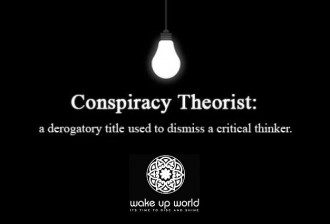| Online: | |
| Visits: | |
| Stories: |

| Story Views | |
| Now: | |
| Last Hour: | |
| Last 24 Hours: | |
| Total: | |
The Critical Thinking Trap: How the “Conspiracy Theory” Label Undermines the Truth
Guest Writer for Wake Up World
Conspiracy Theories: The Public Trust Skepticism Factor
“Conspiracy” is a real word for a real events that have taken place in human societies in all cultures throughout human history. [see Appendix A]
The assassination of the President of the United States on national television by a “lone” assassin, Lee Harvey Oswald, who himself is assassinated the next day by another “lone” assassin—would cause even the most rational skeptic, or critical thinker, to question the institutional narrative of the events. [1] In other words, the institutional narrative, or official explanation, of a lone assassin who was in turn assassinated the very next day by another lone assassin, is as epistemically dubious, and as equally “silly and without merit”, as any of the conspiracy theories surrounding the JFK assassination.
The human species has evolved as pattern-seeking, cause-inferring animals. As such, our nature drives us to find meaningful relationships to understand the world. Conspiracy theories are offered as alternate explanation to an important social, political or economic event (henceforward, “The Event”) when the institutional narrative is confusing or unsatisfactory.
Conspiracy, originally a neutral term, has acquired a somewhat derogatory meaning since the mid sixties, for it implies a paranoid tendency to see the influence of some malign covert agency in certain events. Conspiracy theorizing has become commonplace in the mass media and emerged as a cultural phenomenon in the United States following the public assassination of JFK.
Noam Chomsky, linguist and scholar, contrasts conspiracy theory as, more or less, the opposite of institutional analysis. The latter focuses mostly on explanations based on the information found in official records of publicly known institutions, whereas the former offers explanations based on information derived from coalitions of individuals.
Follow Wake Up World On…
[FACEBOOK]: http://www.facebook.com/joinwakeupworld (An interactive community of over 2,800,000)
[PINTEREST]: http://pinterest.com/wakeupword/
[TWITTER]: http://twitter.com/joinwakeupworld
[YOUTUBE]: http://www.youtube.com/joinwakeupworld
[GOOGLE PLUS]: https://plus.google.com/112452105795129310867/posts
[WEBSITE]: http://wakeup-world.com




